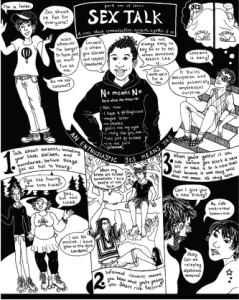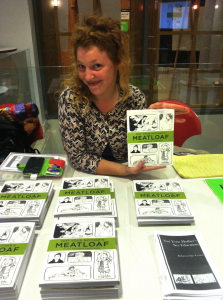Somewhere, deep in the recesses of the memory of any American high school graduate, is the uncomfortable, embarrassing memory of sex ed–a gym teacher putting condoms on bananas, quizzes on the anatomy of different genitals, and overwhelming statistics about teenage parents. In the first meeting of the New School Sex-E Collective, when members shared their experiences with sex education, the typical answer involved a high school health class, remembered severe warnings about STDs (with corresponding pictures of a herpes outbreak), and parents fumbling around questions of reproduction. Almost no one seemed to recall a discussion about consent, pleasure, or any sort of sex that wasn’t heterosexual.
According to a Centers of Disease Control and Prevention report, the majority of formal sex education taught in high school today only cover methods of birth control, sexually transmitted diseases, HIV/AIDS, and how to remain abstinent. While these are important, other issues such as consent, pleasure and the wide variety and spectrum of sexuality and gender, appear to be glossed over or eliminated completely. But now, a recent rise in comprehensive peer-to-peer sex education has surfaced, giving young people the option of learning about sex through not only their friends, but through websites and social media platforms.
“We try to spread the word to everyone that there is a club called the Sex-E Collective for sex positive education…and that it’s inclusive to everyone…it’s peer to peer and we know that people of every age tend to be more receptive to their peers and to groups they identify with,” says Rachel Knopf, a health educator and Wellness coordinator at The New School, who works very closely with the Sex-E Collective.

Lang graduates Liza Bley and Saiya Miller are at the forefront of this movement, with their recently published book Not Your Mother’s Meatloaf. Through the book, they challenge and counter the oversight of consent, pleasure, sexuality and gender that appear to be eliminated from modern day sex education. The project started out as a senior thesis. It soon turned into a collaborative, underground zine comic book, featuring graphic art about a range of issues having to do with sex, relationships and sex education.
Early this September, Bley and Miller came to The New School to present sections of their book. The presentation included illustrated anecdotes about going to the gynecologist, learning about different types of genitalia, and how to realize when a relationship is abusive. During the event, they also shared experiences from their own lives and childhoods, like reading about human reproductive organs in Gray’s Anatomy, and being called a lesbian in elementary school after seeing a friend change her clothes.

Knopf recalled her high school sponsored sex education experience in the 1990s was not very positive. “We had a horrible health teacher who taught us about STDs, and his whole way of teaching was he ‘knew a guy who had it’,” Knopf says. She continued to describe the dreaded “how to use a condom” demonstration run by her old gym teacher. In Knopf’s sex education courses, everyone was assumed to be heterosexual and cisgender (meaning you identify with your birth assigned gender)
In the United States, sex education began in the 1830s with Sylvester Graham, an American dietary reformer and inventor of the first generation of graham crackers. He traveled along the East Coast warning people of the “dangers” associated with male masturbation.
Although sex education has evolved from the anti-masturbation sermons of yore, educators believe that it still has a way to go in terms of accessibility, inclusivity and body and sex positivity. Liz Slagus, co-creator of the SexEd Project, a community- and art-based effort to destigmatize sex education, says “There are a lot of non-physical and technical elements that need to be included in our sexual health education. Body and sex positivity are huge.” Body positivity refers to the idea that all bodies, regardless of size, shape, or level of mobility and dexterity are beautiful and can work in a unique way.
This new take on sex-ed is fueled by publishing opportunities online and in zine culture. Sites such as Tumblr and blogs like “Radical Sex Education” provide resources, tips and guides about topics like different types and uses of sex toys and emergency contraception. Allison Moon, sex educator and author of the comic book Girl Sex 101 is also at the forefront of peer-to-peer sex education. “Many books position themselves as ‘Dr. Expert Explains It All,’ says Moon. “I want Girl Sex 101 to be ‘Big Sister Gives Some Good Advice’, moreover include a social media element where people can answer questions about their sex lives for inclusion in the book– true peer to peer education.”
In the United States, sex education needs reform so badly that writers satirize it in films and television shows. The cartoon “South Park” has an episode entirely about inadequate sex education, and of course, there is the famous health class scene in the film “Mean Girls”, where an unqualified gym teacher proclaims “Don’t have sex. You will get pregnant. And die.”
Authors like Liza Bley, Saiya Miller and Liz Slagus, and educators like Rachel Knopf and Tamara Oyola-Santiago, another New School health educator, continue to change sex education and its role in the student’s life. They, along with the dozens of other bloggers and zine creators, believe learning about sex should be a positive and empowering experience that validates everyone’s identities and preferences without the stigmatization that is present in many curriculums. In the words of Oyola-Santiago, “Sexuality is really beautiful and diverse.”
Reporting by Francia Sandoval








Leave a Reply